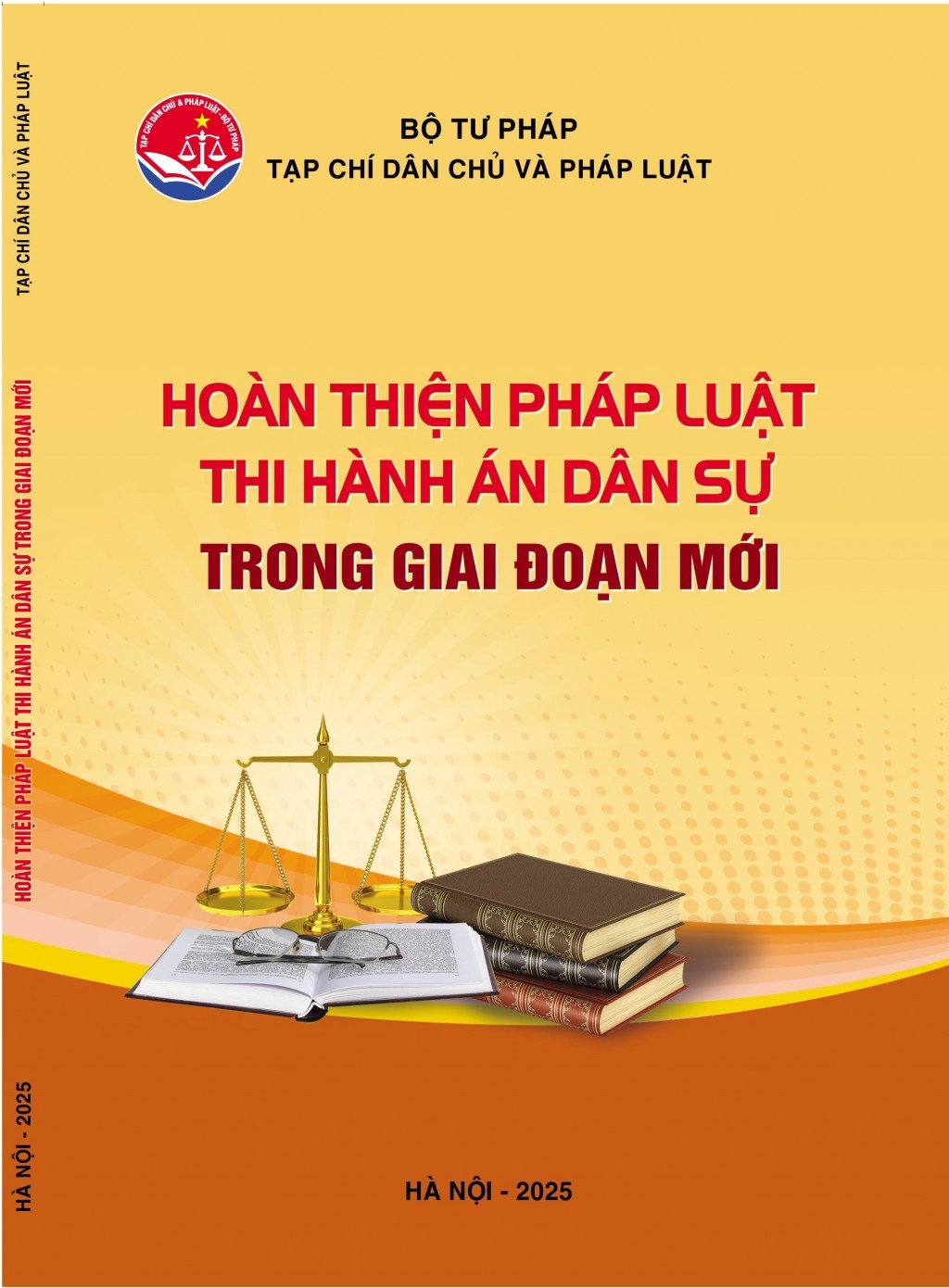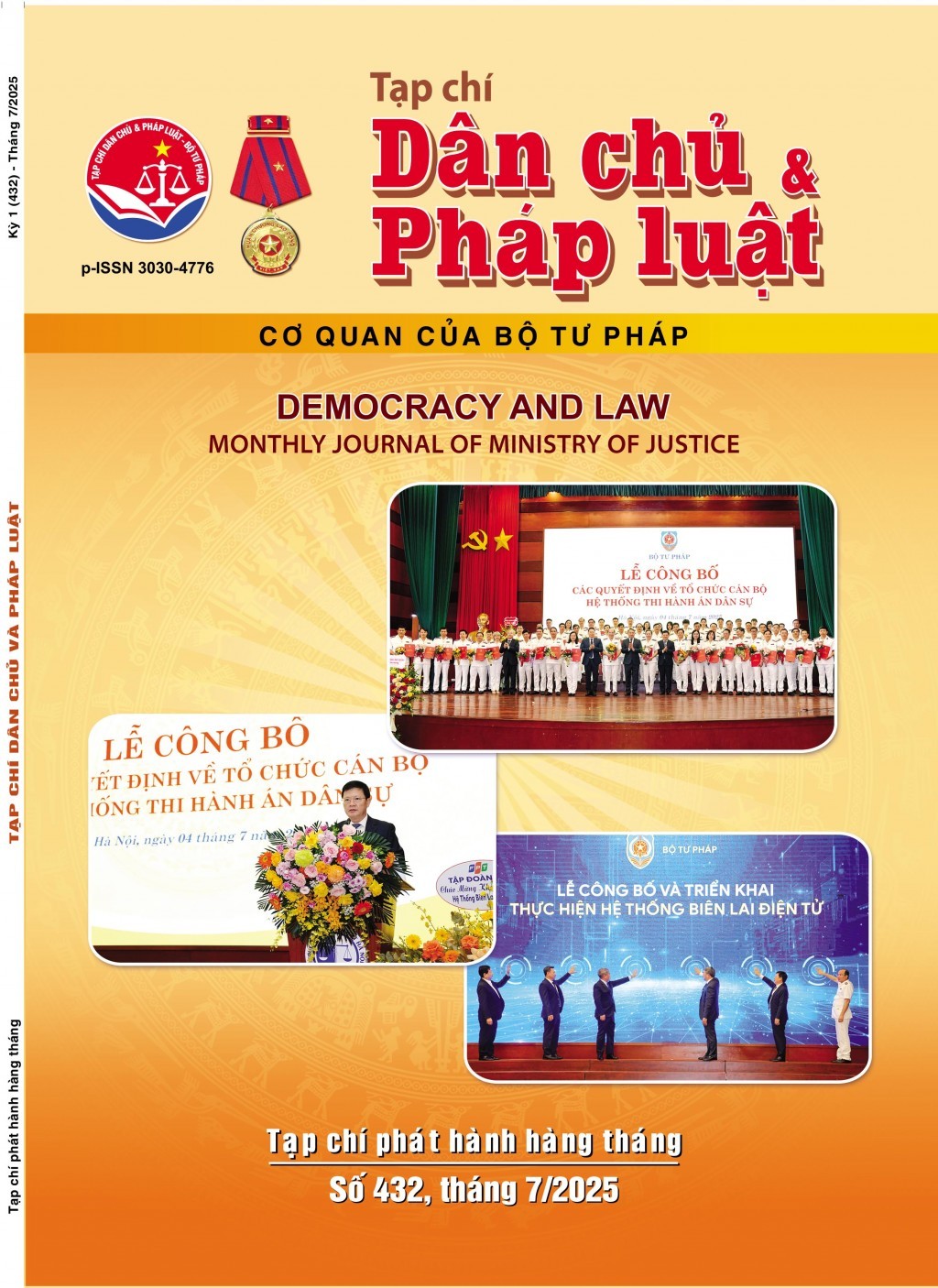
TRONG SỐ NÀY
XÂY DỰNG VÀ HOÀN THIỆN PHÁP LUẬT
1. Trương Hồng Quang - Pháp luật về tổ chức và hoạt động của bộ máy nhà nước sau 10 năm thi hành Hiến pháp năm 2013
2. Khúc Thị Phương Anh & Vũ Công Giao - Vận dụng phương pháp tiếp cận dựa trên quyền con người trong việc kiểm soát thuốc lá mới ở Việt Nam
3. Đặng Thị Hoài - Hoàn thiện pháp luật về ban hành văn bản quy phạm pháp luật theo trình tự, thủ tục rút gọn ở Việt Nam
4. Hà Trọng Bắc & Phạm Thu Hằng - Yêu cầu của nền quản trị quốc gia hiện đại đối với pháp luật về đăng ký biện pháp bảo đảm
5. Nguyễn Đình Văn - Hoàn thiện quy định của Bộ luật Hình sự năm 2015 về các tội phạm tham nhũng
6. Trần Phi Long - Bàn về hình phạt cảnh cáo trong Bộ luật Hình sự năm 2015
7. Đinh Thế Hưng - Bàn về một số nội dung của Dự thảo Luật Phòng, chống mua bán người (sửa đổi)
TỔ CHỨC THI HÀNH PHÁP LUẬT
8. Phạm Thị Phương Thảo - Một số khuyến nghị đối với định hướng sửa đổi, bổ sung quy định trong Dự thảo Luật Phòng, chống mua bán người (sửa đổi) nhằm thực hiện có hiệu quả quyền bình đẳng giới
9. Phạm Minh Hải - Vướng mắc trong giải quyết nguồn tin về tội phạm do cơ quan có thẩm quyền tiến hành tố tụng trực tiếp phát hiện trong trường hợp bắt người phạm tội quả tang
10. Lê Nhật Hồng & Nguyễn Phương Thảo - Trách nhiệm pháp lý của doanh nghiệp cung cấp dịch vụ trung gian đối với hành vi xâm phạm quyền tác giả
11. Nguyễn Tấn Phi Hùng - Một số kiến nghị hoàn thiện pháp luật về chuyển nhượng hợp đồng kinh doanh bất động sản
12. Lê Thị Khánh Hòa - Cải cách thủ tục hành chính thông qua mô hình “một cửa điện tử” - Nhìn từ thực tiễn thành phố Thủ Đức, Thành phố Hồ Chí Minh
***********************************************
CONTENTS
LAW MAKING AND LAW COMPLETION
1. TRUONG HONG QUANG - Law on the organization and operation of the state apparatus after 10 years of implementing the 2013 Constitution
2. KHUC THI PHUONG ANH & VU CONG GIAO - Applying a human rights-based approach to new tobaco control in Viet Nam
3. DANG THI HOAI - Completing the law on promulgating legal documents according to shortened process and procedures in Vietnam
4. HA TRONG BAC & PHAM THU HANG - Requirements of modern national governance for the law on registration of secured measures
5. NGUYEN DINH VAN - Completing the provisions of the 2015 Penal Code on corruption crimes
6. TRAN PHI LONG - Discussing the warning penalty in the 2015 Penal Code
7. DINH THE HUNG - Discussing some contents of the Draft Law on Prevention and Combat of Human Trafficking (amended)
LAW IMPLEMENTATION
8. PHAM THI PHUONG THAO - Some recommendations for the direction of amending and supplementing the provisions in the Draft Law on Prevention and Combat of Human Trafficking (amended) to effectively implement the right to gender equality
9. PHAM MINH HAI - Difficulties in handling information sources about crimes directly discovered by competent authorities conducting proceedings in cases of arresting criminals in the act
10. LE NHAT HONG & NGUYEN PHUONG THAO - Legal responsibility of enterprises providing intermediary services for acts of copyright infringement
11. NGUYEN TAN PHI HUNG - Some recommendations for improving the law on the transfer of real estate business contracts
12. LE THI KHANH HOA - Reforming administrative procedures through the "electronic one-stop service" model - Looking from the practice of Thu Duc city, Ho Chi Minh City














